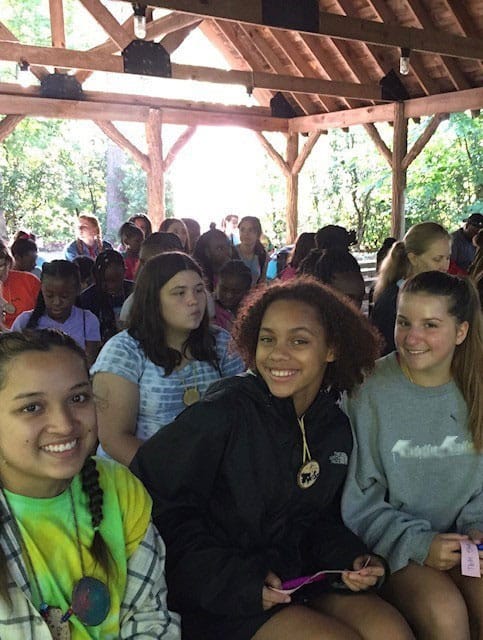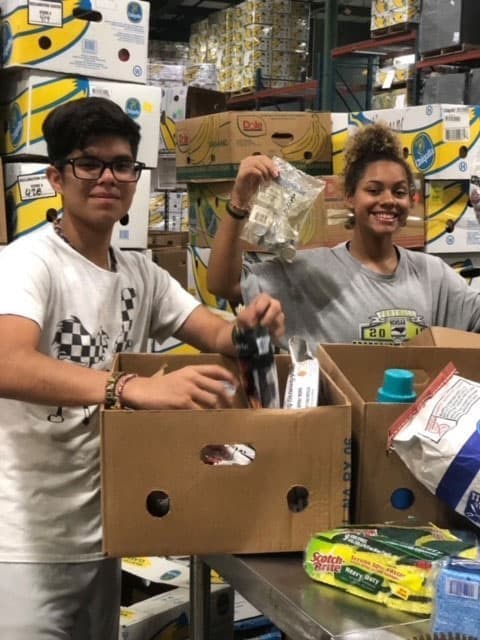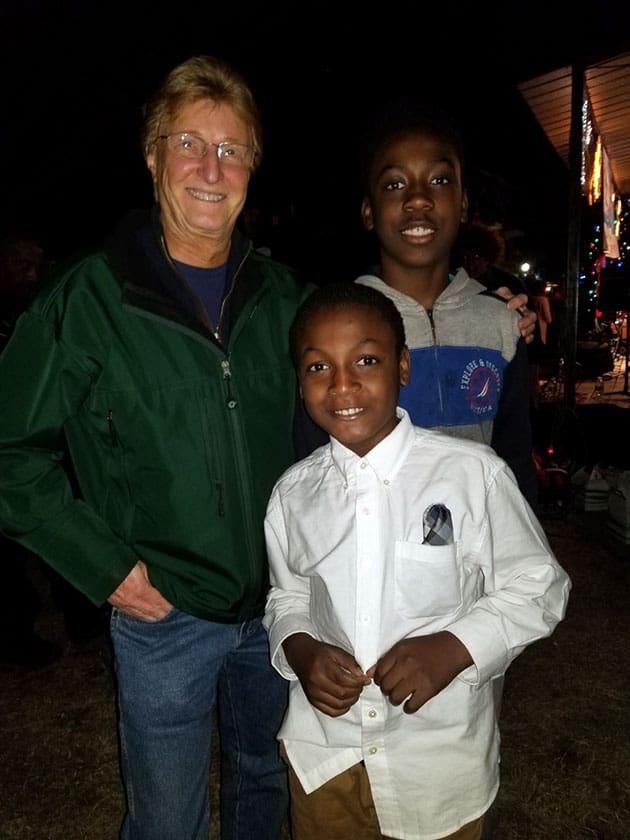-
GROWING IN GRACE: AFTER-SCHOOL MENTORS BRING HOPE TO NORTH CAROLINA KIDS
How a small group of volunteers makes a world of difference for Angel Tree kids in North Carolina.
Ask Ariana Cox about Camp Hope, she'll tell you about the Blue Hippopotamus song. The rock walls she conquered. The tree just outside the cafeteria door with edible leaves that taste like sour apples.
But chat a little longer, and you'll hear about how 17-year-old Ariana learned at camp that she isn't alone—that there are other kids with a parent in prison, and that God sees and loves her.
"I met a whole lot of people [who] have the same problems that I have," she says. "It's like family there. You can't feel misplaced. It opened my eyes to God."
'It's like family there. You can't feel misplaced. It opened my eyes to God.'.
LEARNING THEY ARE LOVED
Ariana has been going to camp for the past seven summers because of Christ Episcopal Church in New Bern, North Carolina.
Christ Church had been serving local children with an incarcerated parent through Angel Tree® Christmas for many years. Each December, volunteers deliver a gift on behalf of the mom or dad behind bars. But Christ Church wanted to do more—and so in 2006, they started a camp for Angel Tree kids.
For a week every summer, 60-80 children from New Bern and other North Carolina towns board busses rented by Christ Church and gather for a week of outdoor activities, laughter, and healing.
'When we have our devotional groups in the evenings, there's always a lot of tears," says Terry Brubaker, Christ Church’s Camp Hope coordinator. "There's a lot of kids telling about what's going on in their life and how they feel about it. And I just know that God wants them to be able to get that out—that He doesn't want them to have that knot in their heart all the time."
Terry loves seeing the way campers open up and grow over time. She says that many develop leadership skills and gain confidence as the years go by.
"They tend to become more accepting of others and better group participants," Terry says. "The biggest thing at camp is them knowing that they are loved, not only by God—always, always, always, and never-ending—but by the people that are there with them at camp."


'The biggest thing at camp is them knowing that they are loved, not only by God—always, always, always, and never-ending—but by the people that are there with them at camp.'
GROWING IN GRACE
Some of those people are Christ Church volunteers. Every year, 10–12 church members give a week of their summer to help out at camp. But Jim Behl wasn't invited to volunteer at Camp Hope—he was ordered to.
"Mr. Jim, are you going to camp?" asked Jonathan. "You've got to go to camp, Mr. Jim."
It's hard to turn down a persistent 8-year-old—and so Jim went.
Jim and Jonathan met at Growing in Grace, an after-school mentorship program Terry started five years ago.
"One year, when we were coming home from camp, I kept getting in my head this idea that we just have to have more contact with these kids," she says. "This one week of camp is so good, and they learn so much, and they grow so much, and become closer to God. And we just need an opportunity to do this more."
And Growing in Grace was born.
Four days a week, church volunteers pick up local third to fifth graders from school and bring them to the church building for the two-hour program. Most of them are Angel Tree kids; all come from low-income households. Christ Church asks school counselors, teachers, and nurses for names of children who could benefit from the after-school program.
The children play, have a snack, and listen to a devotion. Then they spend one-on-one time with a mentor working on homework.
'We just need an opportunity to do this more.'
STEADY ENCOURAGEMENT
Jim was enjoying retirement when the rector of Christ Church approached him about Growing in Grace’s need for male mentors. Jim doesn't have kids of his own, and his career in medical electronics wasn't exactly preparatory for coming alongside reluctant learners. But through flexibility and patience, Jim has found that he has quite a knack for helping kids.
Sometimes he takes them aside and explains why math homework matters. Other times, he has to get a little stern, he says. But Jim's mentees usually come around to the idea of taking ownership of their academics—and often, their grades improve considerably.
"It's learning and empathizing as much as you can with what they are going through," Jim says.
He isn't surprised the kids have trouble focusing—he has visited their neighborhoods and witnessed fights on the streets. He knows that many parents are in and out of their kids' lives. And so Jim is motivated to be a source of stability and encouragement however he can.
He isn't surprised the kids have trouble focusing ... And so Jim is motivated to be a source of stability and encouragement however he can.
BEYOND HOMEWORK HELP
Jim mentored Jonathan and his brother Kaleb, too. On Sundays, he often took them out to throw a football, eat ice cream, or see a movie.
"I always enjoy taking them out and just talking about all kinds of things," Jim says. "It's very rewarding. [It has given me] a real appreciation for what their life is like."
In addition to helping with homework and fostering relationships with positive role models, Growing in Grace tries to give kids new experiences like singing in a choir and learning to play the ukulele. Sometimes the children take field trips or make gifts for a local homeless shelter.
"[Christ Church] helps a lot of children that don’t get to see the beach, that don't get to play an instrument," says Watanya Jones, the mother of a fourth grader who is part of the program. "I know about a ukulele, but we don't have that kind of stuff around the home. They do really good things for the children that are in the program, things they wouldn't do on a regular basis with their own family."
Watanya says her son used to struggle with separation anxiety but has thrived due to the one-on-one mentoring he gets at Growing in Grace.
"Now he is like a grown man," she says. "He can do things without me now."
[Angel Tree does] 'really good things for the children that are in the program, things they wouldn't do on a regular basis.'


ENFOLDING FAMILIES
Christ Church keeps finding new ways to enfold Angel Tree families in their community. They encourage parents to come hear their children sing in church on Sundays. They extend invitations to Bible studies; Ariana attended a Wednesday night group for teens for a while. The Growing in Grace kids stay late for pancakes on Shrove Tuesday and services on Ash Wednesday, and Christ Church welcomes parents to come, too.
They don't forget about the incarcerated parents, either. Prison Fellowship® sends Bibles to prisoners, and Christ Church contributes to this effort.
"We feel like that's a real benefit to the kids," Terry says. "We don't know if it's their parents or not, but it's some kid's parents."
Christ Church's commitment to Angel Tree kids never stops. It's tiring at times. But for Terry, the motivation is crystal clear.
"What a life they've had with all of the commotion, all the chaos, all the heartbreak," she says. "You just want to have that turn around for them. You know God is there and that He can do that. And you know that they can be anything they want to be, if they can just get that into their head and their heart. So we try real hard to do that. We just have to keep praying that we can have the energy to do it. And we are so grateful to Angel Tree for all the support that we get from them."
'What a life they've had with all of the commotion, all the chaos, all the heartbreak ... [yet] you know God is there and that He can do that.'